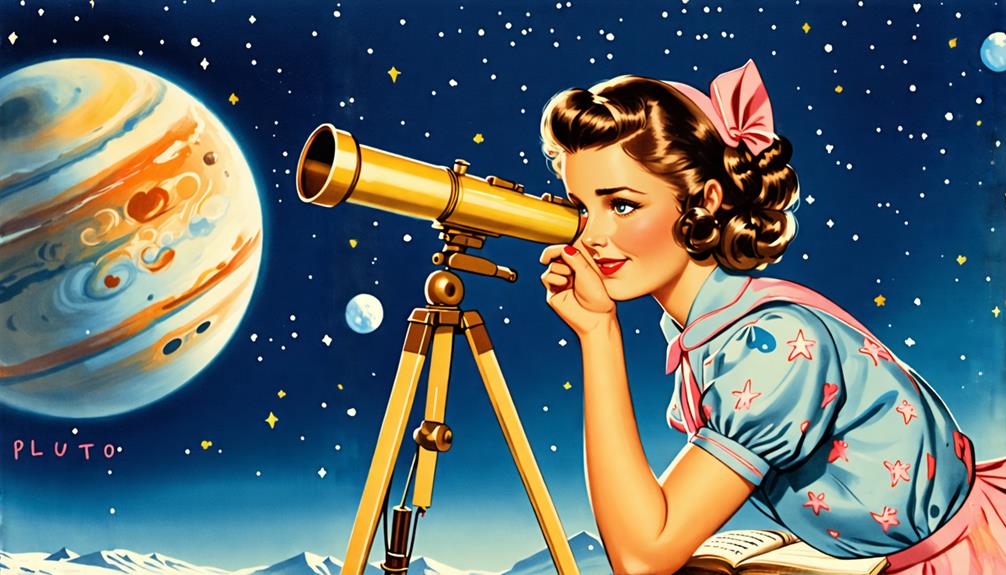You might think that naming celestial bodies is solely the domain of astronomers and scientists, but the story of Pluto's naming proves otherwise. When you consider that an 11-year-old schoolgirl suggested the name for this distant world, it challenges your assumptions about who can contribute to scientific discoveries. Venetia Burney's simple breakfast conversation led to a lasting impact on our solar system's nomenclature. Her story raises intriguing questions about the role of youth in scientific advancements and the unexpected sources of inspiration that can shape our understanding of the cosmos. What other surprising contributions have children made to science?
Key Takeaways
- Venetia Burney, an 11-year-old English schoolgirl, suggested the name 'Pluto' for the newly discovered planet in 1930.
- The name was inspired by Roman mythology, with Pluto being the god of the underworld.
- Venetia's grandfather, Falconer Madan, communicated her suggestion to Lowell Observatory, where it gained traction.
- Astronomers unanimously voted to adopt 'Pluto' as the official name for the celestial body.
The Naming of Pluto

In a stroke of youthful brilliance, 11-year-old Venetia Burney forever etched her name in astronomical history by suggesting the name 'Pluto' for the newly discovered planet in 1930. During breakfast on March 14, she proposed the name inspired by her knowledge of Roman mythology. Her grandfather, Falconer Madan, relayed the suggestion to astronomers at the Lowell Observatory, where it was warmly received.
The name Pluto was chosen for its connection to the Roman god of the underworld, reflecting the planet's distant and dark nature. It also coincidentally matched the initials of Percival Lowell, the observatory's founder. After a unanimous vote among astronomers, Pluto became the official name.
Venetia's contribution was recognized with a five-pound note and later honored during the New Horizons mission in 2015, cementing her place in the history of planets and astronomy.
Venetia Burney's Celestial Contribution
Venetia Burney's breakfast table inspiration launched her into astronomical fame, solidifying her place in planetary history. At just 11 years old, Venetia suggested the name 'Pluto' for the newly discovered celestial body after reading about it in the Times of London.
Her grandfather, Falconer Madan, relayed her idea to astronomers at the Lowell Observatory, where it gained traction. The name was chosen not only for its connection to the Roman god of the underworld but also because it honored Percival Lowell, the observatory's founder.
Venetia's contribution went largely unrecognized for decades, earning her only a five-pound note at the time. However, her role is now celebrated as a pioneering moment in astronomy, demonstrating how even young minds can greatly impact scientific discovery.
Venetia Burney's simple suggestion forever changed our understanding of the solar system.
Legacy of a Schoolgirl's Idea

Few ideas from children have left such an indelible mark on astronomy as Venetia Burney's suggestion to name Pluto. This 11-year-old schoolgirl's knowledge of mythology inspired her to propose the name during breakfast. Her grandfather's connection to astronomers guaranteed her suggestion reached the right ears.
Venetia's legacy extends far beyond her initial five-pound reward:
| Legacy Item | Description |
|---|---|
| Asteroid | Named after her |
| Instrument | Dust-measuring on New Horizons |
| Recognition | Celebrated during New Horizons mission |
| Inspiration | Encourages young astronomers |
| Cultural Impact | Pluto's name in popular culture |
You can see how a single idea from a young girl named Pluto has resonated through decades. Her contribution to astronomy serves as a proof of the power of curiosity and knowledge, inspiring future generations to reach for the stars.
Conclusion
You've learned how an 11-year-old girl's breakfast-time idea changed astronomy forever.
Venetia Burney's simple suggestion, inspired by mythology and cleverly incorporating Percival Lowell's initials, became the name of a celestial body.
While Pluto's classification has changed over time, Venetia's legacy endures.
Next time you look up at the night sky, remember that even the youngest among us can make lasting contributions to our understanding of the universe.

Leave a Reply